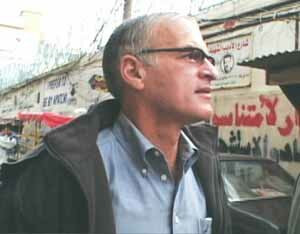By Jim Quilty, The Daily Star (Lebanon) – 23 Sept 2009
www.dailystar.com.lb/article.asp?edition_id=1&categ_id=4&Article_id=106677

Norman Finkelstein
BEIRUT: A dissenting voice is a peculiar thing. For those with a stake in a political status quo, the more contentious the issue, the more the dissident must be silenced. How this is done depends on how confidently the political class controls the state.The more insecure the political class, as conventional readings would have it, the more likely it will resort to imprisonment and execution to eliminate domestic dissent. When the political class is secure – or faces institutional obstacles to the use of arbitrary coercion – it must resort to discrediting and ostracizing the dissenting voice.
“American Radical: The Trials Of Norman Finkelstein” is in many ways a study in how the American political class – specifically the segment of this class that advocates Israel’s state of exception in American foreign policy – goes about silencing its dissidents. The film by David Ridgen and Nicolas Rossier opened the Docudays film festival on Tuesday evening.
The film adheres to the classical template that has been adopted when profiling figures on the American Left – the industry standard having been set by Peter Wintonick and Mark Achbar’s 1992 doc “Manufacturing Consent,” a portrait of Finkelstein’s mentor, MIT linguistics professor and US foreign policy critic Noam Chomsky.
“American Radical” interviews Finkelstein about his upbringing and its relationship to his work, interspersed with footage of him hectoring hostile audiences and the like. This is supplemented with testimonials from colleagues, friends, family and adversaries, with the aim of rendering a multifaceted image of the man. Given the tone of uncompromising adulation that can underlie such profiles, audiences may be surprised at how frank this portrait of Finkelstein is.
Adversaries like American lawyer Alan Dershowitz can be counted on to deliver withering criticisms of the subject – not unexpected given that, after reading Dershowitz’s New York Times bestseller “The Case for Israel,” Finkelstein accused him of plagiarism.
Colleagues like Chomsky and John Mearsheimer (who co-wrote with Stephen Walt “The Israel Lobby”) praise Finkelstein’s careful scholarship.
Finkelstein’s family and friends are confident his strong Israel-critical position derives from the iconoclastic lessons his parents (and particularly his mother) learned in the Nazi concentration camps. Rather than emerging from the experience with strong, unconditional loyalty to the state of Israel, Finkelstein’s mother evinced a visceral distaste for injustice that, in the words of her son, verged on hysteria. Finkelstein the younger internalized this position, particularly when the memory of the Holocaust was invoked to justify Israeli injustice against the Palestinians.
His recollections of his parents’ Holocaust experience, his response to Israel’s violence upon the Palestinians, even his forceful broadsides upon his adversaries, radiate emotional fragility. In short, Ridgen and Rossier’s profile is far from an unconditionally flattering one.
The reasons America’s Zionist sympathizers feel compelled to silence Finkelstein will be no surprise to habitués of this region. He is among a handful of US intellectuals to present forceful, reasoned and systematic critique of Israeli policies vis-à-vis the Palestinian people.
As several of Ridgen and Rossier’s informants point out over the course of this 87-minute-film, Finkelstein’s Jewish heritage lends his arguments a particular cache. This is a position he shares with a small number of Jewish critics of Israel, ranging from Chomsky to younger activists like Adam Shapiro, co-founder of the International Solidarity Movement, to certain ultra-orthodox Jews who regard Zionism as anathema to God’s will.
Though he faces many of the same moralizing epithets as these colleagues – “self-hating Jew” seems popular – Finkelstein is singled out for special opprobrium by Zionist apologists due to the acerbic tone with which he frames his critique. Much as they respect the substance of his work, even colleagues like Chomsky and Mearsheimer wonder whether his findings are best served by his style.
His answer to the charges that his Zionist-critical positions are driven by his emotionally conflicted identity is at once informative and creditable: “Let’s say I have deep identity conflicts … What’s the relevance? The only relevant question is whether what I’m saying is true or false. Let’s say Einstein had deep identity conflicts. How does that influence one’s judgment about his physics?”
As with any art form, one criteria for the worth of a documentary film lies in its implied relevance, which gives the work petinence beyond its explicit narrative. More than outlining what opposition a Zionism-critical intellectual faces in the US today, “American Radical” suggests some of the emotional and intellectual extremity that makes an individual willing to oppose a prevailing political hegemony.
Finkelstein and his colleagues on America’s intellectual Left implicitly confront something much more fundamental than Israel’s policies toward the Palestinians. By questioning Israel’ presumed state of exception, they challenge post-modernity’s tribalization of politics, which since 1948 has pushed minority exceptionalism – whether religious or ethnic, in Israel, the former Yugoslavia or this country – into the vacuum left by the retrenchment of state responsibilities to its citizens.
Perhaps this is a fitting context in which to appreciate Finkelstein’s inability to get a tenure-track job in the US, despite his extensive list of citcally praised publications. After the US publication of his book “The Holocaust Industry” in 2001, Hunter College, where Finkelstein had worked for nine years, cut his salary and workload, forcing him to resign. When, after a years-long media battle with Dershowitz, Finkelstein came up for a tenured position at DePaul University, the university administration denied him this position, despite the overwhelming support of the university faculty.
Subsequently, the film informs you, a group called “The Jewish Defense Organization launched a ‘Drive Out Traitor to the Jews’ campaign, plastering flyers in [Finkelstein’s] apartment building and calling on the landlord to evict him.”
Docudays continues at Metropolis Art Cinema until 30 September. ‘American Radical: The Trials Of Norman Finkelstein’ will screen again on 26 Septmber. For more information see www.docudays.com.
Tagged as: Activism, anti-Occupation, Norman Finkelstein







































